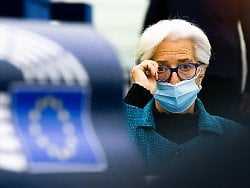“Adjustment will be gradual”
Lagarde only wants to gradually adjust monetary policy
2/14/2022, 9:42 p.m
The sharp increase in consumer prices is putting the ECB under pressure. The inflation rate rose to 5.1 percent in the euro zone in January. Nevertheless, President Lagarde made it clear to the EU Parliament in Strasbourg that an abrupt change of course would not happen any time soon.
According to its President Christine Lagarde, the European Central Bank (ECB) will not initiate an abrupt change of direction. “Any adjustment to our monetary policy will be gradual,” said Lagarde in the European Parliament in Strasbourg. She also advocated that monetary authorities should be more flexible than ever given the current uncertainty.
“Our monetary policy is always data dependent and this is all the more important in the situation we are facing right now,” said the central bank governor. Speculation on interest rates had recently run rampant on the stock exchanges. There it was even assumed that interest rates would rise by 50 basis points by December. The last time the ECB raised interest rates was in 2011.
At the beginning of February, Lagarde opened the door to a possible rate hike later this year. In view of the current surge in inflation, after the most recent interest rate meeting, she no longer repeated her earlier assessment that a turnaround in interest rates in 2022 was very unlikely. Lagarde reiterated to MEPs that rate hikes will only come after the bond purchases have ended.
Do not raise interest rates prematurely
“A rate hike will not happen until our net bond purchases end,” she said. And for that, according to Lagarde, conditions must be met. These are intended to ensure that interest rates are not raised prematurely. Lagarde pointed out that the monetary watchdogs will have new economic and inflation forecasts from the ECB economists at the interest rate meeting in March.
The euro watchdogs would then be in a better position to assess the consequences of the latest surge in inflation. Inflation in the euro zone surprisingly climbed to a new record of 5.1 percent in January. This is the highest value since statistics began in 1997.
